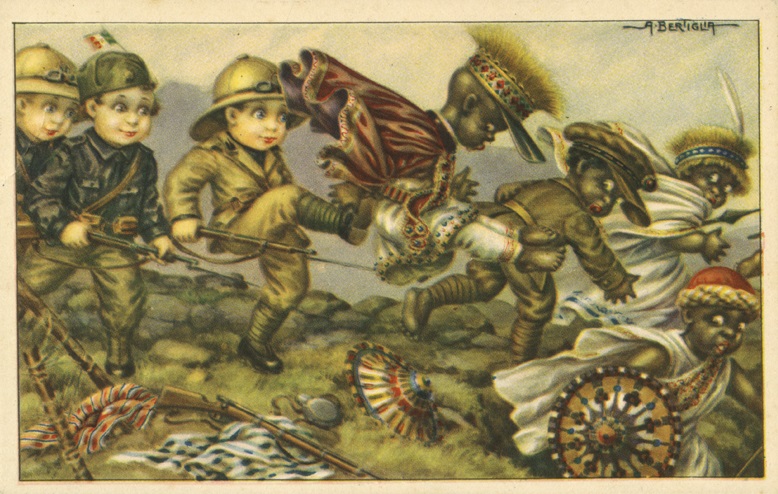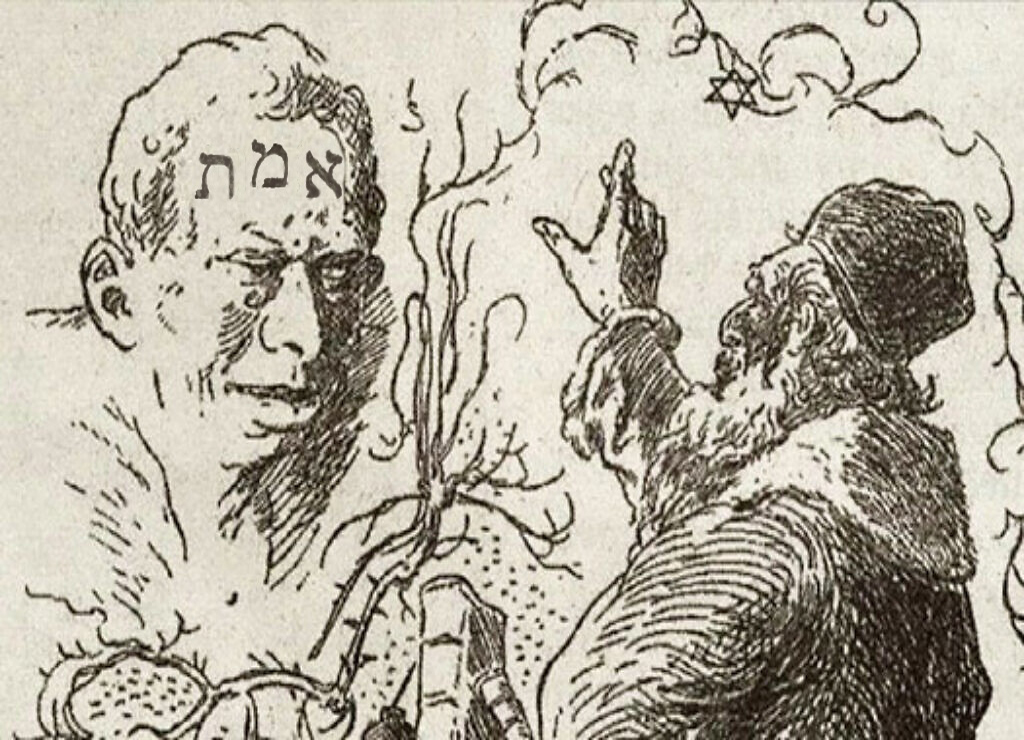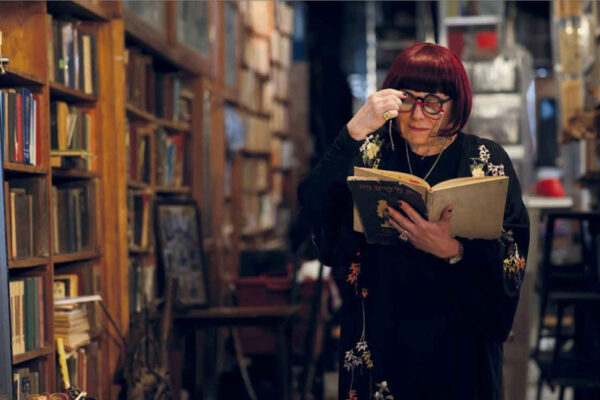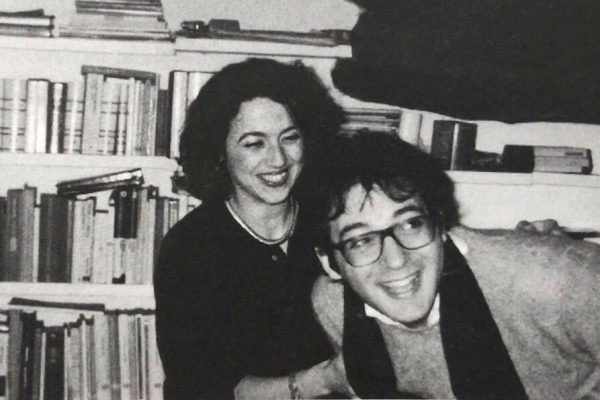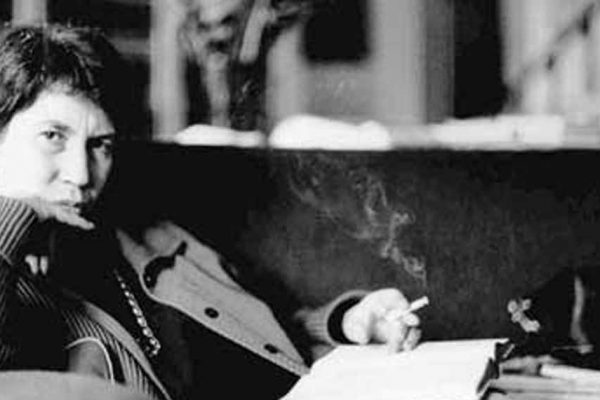Fascist Imperial Dreams, a conversation with Davide Rodogno
by Alessandro Cassin
Mussolini’s short-lived empire has often been thought of dismissively as an operetta affair. In addition to its colonies in Africa, between 1940 and 1943 Italy annexed or occupied a number of territories extending from France Slovenia, Croatia, Dalmatia, Montenegro, Albania, Kosovo and Macedonia to Greece. In the decades following the end of the war, as Italy was rebuilding itself as a democracy, the history of this military occupation and the forced “Italianization” of its people was often downplayed. The post-war myth of the good Italian soldier and of the Italian occupied zones as safe havens for Jews was created and has endured partly because the attention of historians was focused elsewhere.
Yet without a rigorous reappraisal of this period many questions regarding Mussolini’s vision of a new world order, his relationship with his German allies and his approach toward the problem of refugees would remain unanswered. All of this and much more is what Davide Rodogno set out to research in his impressive Fascism’s European Empire: Italian Occupation during the Second World War, Cambridge University Press, 2006.
Rodogno, who teaches who teaches history at the Graduate Institute of International & Development Studies in Geneva …, grounds his arguments in substantial new archival research and findings. He has come up with new and often unsettling conclusions.
As scholars in the 1980’s have demolished the view of Italian colonialism as humanitarian, and others in the 1990’s have refuted the theory that Italian Anti-Semitism had been imposed by Nazi Germany and only reluctantly accepted by the Fascist regime, now Rodogno, in re-examining Italian Military occupation, offers new tools and information to interpret the decisions of the Italian army and diplomacy that postwar historiography had simplified as a function of an alleged blanket compassionate “national character”.
Prof. Rodogno’s effort is a new step toward rethinking the role of Fascist Italy within the European contexts and separate ideologically motivated summary judgments from the legitimate need to pay homage to the many individual Italians from all walks of life who, at great personal risk, worked against the regime and helped Italian and foreign Jews.
A.C. Your book examines in depth, for the first time, Italian military occupation during the Second World War within the framework of Fascist Imperial ambitions. Can you describe briefly how you came to select this specific topic and what were the methodology and the sources you consulted?
D.R. It all started with my master thesis, which was on the historiography of Italian policies toward the Jews in the occupied territories. I began by examining the classic literature on this subject: Hannah Arendt, Leon Poliakov and Jonathan Steinberg. Finally I realized that the only way to find out exactly what had happened, why the Italians had decided not to hand over foreign Jews to the local governments (in the case of Croatia) or to Nazi Germany, was to examine the history of Italian military occupation and annexation starting in 1940, a history that had not yet been closely studied.
A.C. How much of the primary sources were available to you and where are they located?
D.R. Fortunately the bulk of the primary sources was available at the Central Italian State Archive, the Italian Ministry Of Foreign Affairs Archive, and Italian Army Archives in Rome. I had access to mostly everything I needed from military logs to the correspondence between military and civil commanders.
A.C. I imagine those archives were largely untapped…
D.R. With the exception of the Central Italian State Archive where materials had been available and consulted, in the other archives I most often found myself opening folders and boxes which had not been opened since the end of the war.
A.C. How do you explain the paradox by which Mussolini’s Regime which by 1938 had turned overtly Anti-Semitic and who stipulated a military alliance with Nazi Germany in 1939, refused throughout the War too hand over thousands of foreign Jews living in Italian occupied territories?
D.R. The long answer is…my book; the short answer can by summed up in a few essential factors:
– This was happening in the context of the war, a war that Italy was unprepared to fight. By 1942 Italian forces clearly perceived their own military weakness and dangers of losing the war.
– The local context of occupation, in France, Croatia and Greece, each with its specificities.
-The nature of the diplomacy, prestige and authority of the Italian forces with respect to the local populations.
– Last but not least, the nature of Italian Anti-Semitism. Though Italy after 1938 turned officially Anti-Semitic, they did not want to appear subordinate to the Germans: They wanted to deal with the Jewish Question in their own way.
A.C. In you research, you identify a few key concepts in understanding the mind frame of the Fascist civil and military authorities that after 1940 found themselves occupying areas with Jewish populations. One of the key concepts was the idea of the Fascist spazio vitale -vital space. Can you explain its relevance to our topic?
D.R. The concept was a very hazy, loosely defined one, yet at it core stood Fascist Italy’s imperial ambitions. My position is that despite its brevity, the period 1940-1943 should be seen as a period of imperial rule. I do not think we should view these events as short-term military occupation, as historians have largely described it. I argue that the Italian dominion over parts of France, Corsica, Albania, as well as Yugoslavia and Greece, was an aspect of a plan for to set up a “new order” within the so-called spazio vitale. This Fascist equivalent of the Nazi Lebensraum was largely drawn upon Fascist ideas of Italian racial superiority. Mussolini’s new order would provide space and resources for it and the “new fascist man” would thrive within it and dominate all the “subordinated” (i.e inferior) populations.
A.C. You describe Mussolini’s attempt to create a “truly Italian and Fascist racial identity”. How successful was the attempt given that racial policies had began only a few years earlier?
D.R. To a very large extent this was a failure, the concept remained nebulous, to say the least, to many Italians. The Anti –Semitic laws of 1938 must be understood within the broader frame of Italian Fascist racism. Fascist racism goes back to its inception in the early 1920s; evidence of it is largely found in Fascist colonial policies and practices in Libya and elsewhere in Africa, as well as within the Italian Peninsula, as the violent persecution of Slovene and Croat minorities in the North East demonstrates. The Anti-Semitic laws of 1938 did not come out of nowhere, but they were rather the closing of a circle. Mussolini was bent on expelling those who did not fit the model of the new Fascist man. And the Jews, Italian and foreign, did not fit the model.
A.C. How did the idea of a Fascist vital space affect their policies toward the Jews?
D.R. The frontiers of this spazio vitale were not clearly defined plans of conquest and imperial rule; they were fraught with ambiguities. However, within the emerging Fascist Empire, the various nations and people would each have their place according to clearly defined racial criteria, in varying degrees of subordination to the “imperial race” – the Italians.
A.C. Did the Fascists imagine a place for the Jews within their imperial dominion?
D.R. From the outset, in this new imperial order, there was no place for the Jews. The Fascist spazio vitale was judenrein (free of Jews). This does not mean that the Fascist regime intended to murder Mediterranean Jews. The operation the Fascist Regime had in mind was one of ethnic cleansing, one which corresponds to the Latin meaning of the word: ex-terminare (which is expelling from the citadel, the citadel being the vital space in this case).
A.C. Did Italy have a coherent and unified strategy toward the Jews in the annexed and military occupied territories between 1940-1943 or was it constantly adapting to rapidly changing circumstances?
D.R. There is a common thread that can be traced in the policies adopted in France, the former Yugoslavia, Greece and Albania and it has to do with the concept of ethnic cleansing in view of a victorious outcome of the war. But during the war, the Jewish question was not a top priority. The Italians were much more concerned with pacifying the conquered territories, fighting the Allies and fighting the Partisans. Why should they devote time and resources to the Jews, a largely a frightened, non-combative and often culturally and linguistically assimilated population?
A.C. To what extent do you think that the protective attitude that Italians authorities assumed toward the Jews was a function of their weakness as occupiers?
D.R. I would not use the term “protective attitude”, what was happening was a result of political decisions. These decisions were to a large extent stemming from the Italians’ awareness of their military weakness and can be understood best within the context of lopsided dynamic between the Italians and the Germans. The German were accusing the Italians of protecting the Jews, but the Italians themselves never claimed “we are protecting the Jews in our territories”, but rather they were not going to hand over the Jews because those territories were under their jurisdiction. It was an attempt to assert their own authority in the face of a much stronger, interfering ally who systematically encroached the allegedly Fascist vital space.
A.C. It has been suggested that the Italian Royal Army, unlike the Germans military establishment, was not Anti-Semitic. Of course it is impossible to speak of the Italian Army as a homogeneous whole, but did you find evidence of clear Anti-Semitic feelings within the Army, and how wide spread was it?
D.R. I found evidence of some general’s Anti-Semitic feelings, for instance in Yugoslavia. Their confidential dispatches and letters are filled with classic Anti-Semitic stereotypes and prejudice. While this applies to some generals and colonels, it is different if we are talking about the average private. A large percentage of the Italian common soldiers did not have a clear idea of who the Jews really were. Many came from Southern Italy where there were virtually no Jews, so to them Anti-Semitism was hard to grasp for a large number of soldier who were, quite often, illiterate.
A.C. Can you give an example of an Anti-Semitic motivated action by an Italian Military commander?
D.R. In my book there are many. One is the attitude of General Renato Coturri, commander of the 5th Army Corps who tried to prevent Jews from entering the Second Zone of military occupation in Bosnia and Dalmatia (in effect leaving them in the hands of Germans and Croats out to kill them) claiming that Jews were a threat to law and order. Coturri prohibited the presence of all Jewish refugees in the area under his jurisdiction, reported all Jews who had illegally entered after April 30th 1942 to military tribunals, and issued instructions that all attempts at “infiltration” were to be ruthlessly suppressed. He also ordered that anyone caught in breach of the ban on entry into the Second Zone was to be escorted across the demarcation line (where trains were waiting to deport them to Nazi extermination camps in Eastern Europe).
A.C. You argue that often Jews were denied entry into Italian Occupied zones not specifically on racist grounds, but because of their status as refugees.
D.R. Yes, this is an important point, because most Jews were in effect also refugees. There were instances were Christian Orthodox and other groups were denied entrance as well as Jews, because Italians authorities did not want to find themselves swamped by refugees. This story must be told in a nuanced way. At times Jews were not targeted as such, but rather as refugees along with other groups.
A.C. Italian occupying forces in France as well as in the Balkans witnessed respectively Nazi and Ustasha brutality toward the Jews. What effect do you think this had on the Italian commanders and troops?
D.R. During the Second World War, the Italian Army perceived itself as respectful of the laws and codes of war. This was largely a misperception. In fact, before the war, in Libya, Somalia, and Ethiopia, the Italian Army led reprisals and acted against civilian populations “forgetting” about these laws of war, considering that they did not apply to “less” civilized populations. The Italian Royal Army undertook reprisals, internments, and forced displacements of civilian populations, enforcing policies similar to those of other European armies. During the war in Europe (i.e against white and Christian people), the Italian Army’s reprisal against civilians could be very brutal. This was the case of Domenikon, in Greece, (documented in detail by historian Lidia Santarelli), in Slovenia, and in Bosnia Herzegovina. However, horrors such as the camp of Jasenovac in Croatia or the brutality of the German Army in occupied Serbia -as witnessed by Italian soldiers and Carabinieri – shocked Italian privates and officers. Paradoxically, the gratuitous violence of the Ustashas or of the Wehrmacht and SS corroborated the Italian Fascists’ claims of their racial “superiority”.
A.C. While the myth of the good Italian soldier persists, you give ample evidence of Italian brutality against partisans and local populations.
D.R. To corroborate my views on how serious the regime was about carrying out its Fascist imperial “civilizing” mission in the Mediterranean, my research gives abundant evidence of the often brutal Italian repression of partisan activity and of the harsh treatment of civilians in the occupied territories. This fits in with the general thrust of recent historiography on Fascist policies in the African colonies, which has brought to light the atrocities and war crimes committed especially during the subjugation of Libya and Ethiopia. An important number of leading Italian Generals, such as Mario Roatta in Yugoslavia, Alessandro Pirzio Biroli in Montenegro, Carlo Geloso in Greece, had had previous colonial experiences and enforced repression in the Balkans using the same methods they had acquired in Africa. At times the Fascists were as ruthless and brutal as the Germans in their repression of partisan activity and in their racial “engineering” for their new empire.
A.C. Italian occupying forces often found themselves in situations where they were caught between the goals of their own mission, that of their Nazi Allies and the expectations of local authorities. Can you briefly describe, and compare what was happening in the Italian zones in France, Yugoslavia and Greece?
D.R. As far as Greece is concerned, there were only a few Jewish communities in the Italian zone of occupation and in the annexed Ionian islands. There the Italians did not have to deal with problems of the magnitude encountered in Yugoslavia and France, there was no massive influx of refugees. Instead, the Italians intervened several times to transfer a selected number of Jews from the German zone of occupation, particularly from Salonika to the Italian occupied areas. The effort was not a generalized one but, at least initially, aimed at rescuing wealthy Jewish families of Italian origin.
A.C. The State of Israel awarded Guelfo Zamboni the title of Righteous among the Nations. How do you view his actions?
D. R. These were laudable local initiatives from which we should judge as such. Italian diplomats were able to save Jews who had been rounded up by the Nazi and were about to be deported to extermination camps in Eastern Europe. I am sure that Zamboni and Lucillo Merci were animated by the best intentions, but at the same time they were selective and were ultimately able to rescue only a small portion of the Jews of Salonika. Mostly those eligible for Italian citizenship, who, incidentally, happened to be among the wealthiest. I think there was also a political motive: for the Italian authorities, despite being within the Nazi occupied area, viewed Salonika as belonging to the Italian spazio vitale. In the Fascist perspective, the generous and undeserved portions of occupied territories that Germany had allocated to Fascist Italy were far from adequate. Mussolini and his regime, wanted more, much more. Here lies one of the major discrepancies between Fascist ideology and the Regime’s accomplishments.
A.C. How were things different in Yugoslavia?
D.R. In Yugoslavia, Italian forces found themselves facing completely different circumstances. There they faced by an uncontrollable flux of refugees, many of whom were Jews coming from Croatia, Bosnia Herzegovina and even Serbia, (which was occupied by the Germans). It is important to distinguish between local Jewish communities: in Dubrovnik (Ragusa), Split (Spalato), or Rijeka (Fiume), Jews were persecuted by the Italian Regime. Contrary to what some people argue today, Giuseppe Bastianini was an Anti-Semitic governor, and the local Jewish communities were persecuted by the Italians who applied to them the Italian racial laws to their full extent. Then there were groups of Jews who had arrived there from elsewhere and were interned in concentration camps under the jurisdiction of the Italian Second Army Corps.
The Foreign Jews in metropolitan France and Corsica faced yet different circumstances: they were sent to specific towns were they were kept in a situation of confino coatto, (forced residency). Again this was not out of kindness, but the result of a calculation, of political and economic circumstances. The Jews were not perceived as a threat and the Italians did not have the resources or the manpower to construct camps and guard them. Yet I strongly dispute that they were “protected “ by the Italian Fourth Army Corps.
A.C. Italians forced significant numbers of non-Jews into concentration camps in the Occupied Territories. Could you give me some idea of the numbers and explanation for the particular animosity against the Slavs?
D.R. In the annexed and military-occupied Yugoslav territories, the Italian civilian and military authorities deported and confined to concentration camps no less than 100.000 Yugoslav civilians. Almost 12.000 Greek civilians were placed in concentration camps and prisons. As far as the animosity or should we say brutality against the Slavs, I see it as the result of the longest Italian racist propaganda that began in the early 1920’s as the Fascist attempted the “Italianization” of the terre irridente (unredeemed lands) acquired from the Hapsburgs under the terms of the Versailles Peace Treaty. While in Italy Anti-Semitic propaganda became official policy only in the late ‘30’s, anti-Slav propaganda accompanied the whole 20 years of the Fascist Regime.
A.C. You claim that as the war progressed and the rapport between Fascist and Nazi authorities deteriorated, the Italian military became increasingly harsh in its treatment of the populations under its rule…
D.R. As Germany became fully aware of Italy’s economic and military weakness, the relationship began to worsen. Germany’s contempt for its junior Italian ally severely curtailed Italy’s freedom in territories conquered not buy Italian victories, but by German feats of arms. As rebellions against Fascist and Nazi occupation gained strength, the desperate Italian response became increasingly brutal, mirroring the tactics of the Nazis. Although some Italian generals and diplomats worked on a personal basis to save refugees (including Jews), the state and the Royal Army made no attempt to rescue the persecuted, and in fact cooperated to a degree with Nazi atrocities, turning over Jews and other refugees to their persecutors. Studying the documents one is forced to realized that the idea of Italy’s gentle and humane treatment of the peoples under their rule simply doesn’t stand.
A.C. Significant numbers of Jews and other refugees did survive precisely because they found themselves under the Italians rather than the Germans….
D.R. I do not dispute this fact; I am interested in understanding why and how it occurred. The decision of individuals to assist the victims of persecution, both Jews and non-Jews, deserves some explanation. It probably derived from the gradual disintegration of the regime and its institutions, especially after the end of 1942, with the Axis’ defeats in Stalingrad and North Africa. Italian occupying forces in the Balkans and in France found themselves increasingly isolated from a regime that had run out of ideas. The death throes of the regime certainly affected commanders and officials, as well as simple soldiers, in similar ways: disorganization, insubordination and lack of commitment gradually increased and made it easier for some of the persecuted to break the law. Hence, in reality, what may sometimes look like a humanitarian act turns out to be no more than corruption or laziness on the part of soldiers and officials. It is also important to emphasize that sources in Italian archives show no evidence at all of either a coordinated plan to protect the Jews or a conspiracy by the Italian Foreign Office and military leadership to disobey Mussolini’s orders. On the contrary, both military élites and the Fascist establishment worked “toward the Duce” until the beginning of 1943. Mussolini was always kept informed of policies and decisions relating to the Jews and very often Salonika intervened in decision-making.
A.C. Did learning about Hitler’s final solution for the Jewish question affect Italian policies toward the Jews?
D.R. The idea that the Fascist Government stopped allowing the deportation of Jews as soon as it realized that deportation meant extermination is not tenable. As early as mid -1942 the government in Rome had received accurate information regarding Germany’s genocidal policies.
A.C. When and how did the Jews become a possible bargaining chip?
D.R. As the Italian commanders, and Fascist hierarchs in Rome realized that the war was lost, the Jews began to be seen as a possible bargaining chip. Until then they had been mostly used to differentiate themselves from the Germans (as more civilized and less brutal) to the local populations. I would say that the turning point was December 1942: at this point Italian commanders began to prepare for military defeat, they knew it was just a matter of time. With that perception in mind they began to look at the Jews as a bargaining chip with the Allies, with the Germans and to some extent to the local populations. On top of that, corruption became rampant, as they realized that Jews who wanted to go to Palestine could be milked for money.
A.C. After the war Italy never held the equivalent of the Nuremberg Trials. The few Fascist officials who faced trials did not serve their prison sentences. To what extent do you feel that the post-war perception that the Italian Military and civil servants had behaved benevolently is a byproduct of the failure to try Italian war criminals?
D.R. I think that is absolutely correct. The absence of post-war tribunals for Italian war criminals allowed the myth of the good Italian soldier and of Italiani brava gente to be created and to proliferate to this day. In the late 1940’s political leaders and intellectuals created a reassuring and self-acquitting collective portrait of the Italians for the sake of national reconciliation. Animated by the best intentions, supported in their efforts by the US and Great Britain, who were already acting in a Cold War context, Italian anti-Fascists paradoxically contributed to the oblivion of Fascist history and crimes. After the end of the war the Italian Republic refused to extradite Italian war criminals to Yugoslavia and Greece, despite those countries rightful claims.
A.C. Though your research builds on the work of a previous generation of historians, Jonathan Steinberg among others, your book has a particular freshness. It reads largely devoid of ideological bias. How would you characterize your approach?
D.R. I think I have a very simple, pragmatic way of looking at history. I have no political agenda, but rather a burning intellectual desire to understand these events, to know what had actually occurred. What I see as the one large advantage I enjoyed was the availability of the seminal works on Italian racism, Fascism and colonial enterprises that were produced in the late 1980’s and 1990’s. I can’t deny that there is also a generational component. My parents were born after the end of the war, in the South, which has allowed me to study the war period with a kind of helpful distance that scholars of a previous generation might not have had. Which is not to say that I could avoid my own emotional reaction to many of the documents I found in the archives.


